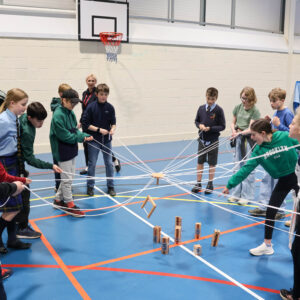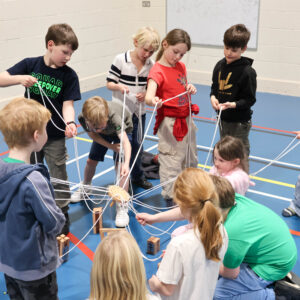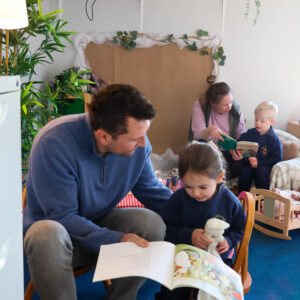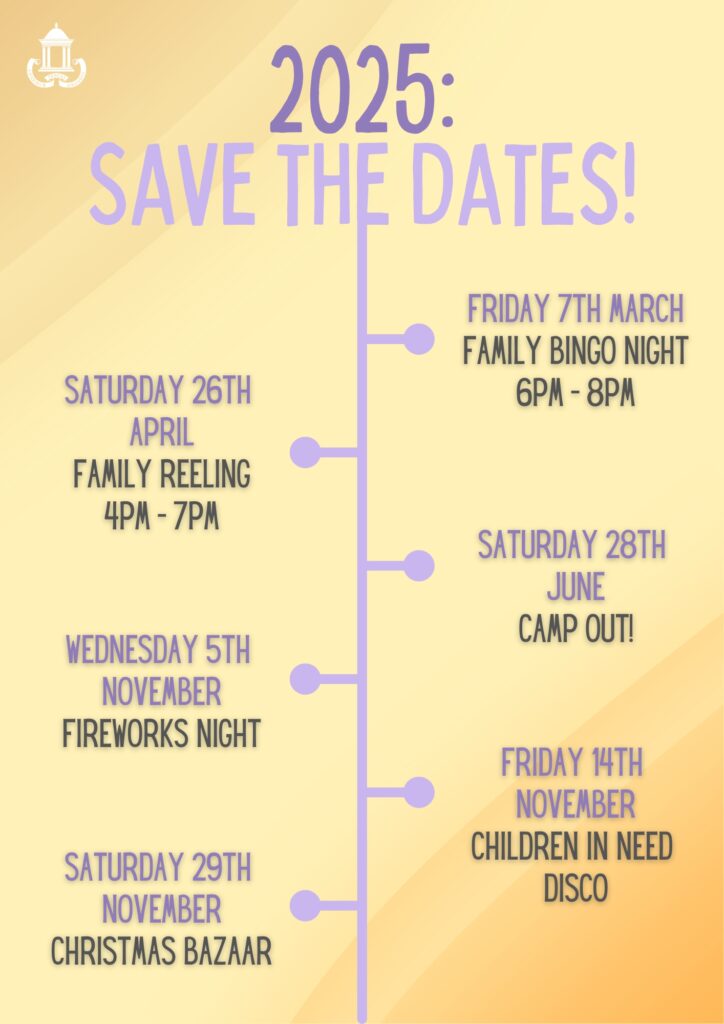Beachborough Newsletter: Friday 7th March 2025
Head’s Blog
“Education is the most powerful weapon which you can use to change the world.” Nelson Mandela
Nelson Mandela’s profound words remind us that the power of education extends far beyond the classroom. It shapes not just our knowledge, but also our capacity for growth, imagination, and resilience. In today’s digital age, however, we are faced with a growing challenge in our educational approach, one that involves balancing technology with personal development. As smartphones become increasingly ubiquitous, the idea of a smartphone-free childhood may seem counterintuitive. Yet, as I discovered earlier this week, it is essential to consider how early smartphone use could potentially hinder the educational and emotional growth of children.
At the start of the week, I had the pleasure of joining a webinar hosted by Clare Fernyhough, where we discussed the implications of smartphone use on a child’s development. Clare, a mother of two and a psychologist, is a passionate advocate for protecting children from the overwhelming impact of smartphones on their mental health. She shared how many parents are caught in a dilemma, on one hand, they want to keep their children connected, but on the other, they fear that denying smartphones could lead to their children being excluded by their peers.
Clare’s concerns are rooted in her research, which highlights the detrimental effects smartphones can have on children’s social, emotional, and cognitive development. So alarmed by the negative consequences, she, alongside a fellow mother, launched the “Smartphone-Free Childhood” campaign. The campaign encourages parents to refrain from giving their children smartphones until they turn 15.
During the webinar, Clare emphasised that while smartphones are undeniably beneficial in many ways, they can disrupt key aspects of childhood development. The constant exposure to rapid information, digital distractions, and social media overwhelms young minds. Children are not fully equipped to process this constant flood of stimuli, leading to difficulties in focusing, disrupted sleep patterns, and heightened anxiety. Furthermore, the abundance of smartphones results in fewer face-to-face interactions, which are critical for children to learn social cues, empathy, and emotional regulation.
As Nelson Mandela’s quote reminds us, education is not just about knowledge, but about shaping the whole individual. A smartphone-free childhood is an investment in a child’s emotional, social, and cognitive growth. It provides the mental space for children to grow, explore, and develop a strong sense of self, free from the overwhelming demands of the digital world.
Of course, the goal is not to demonise technology. In today’s world, balance is key. It is not about rejecting technology entirely, but about finding the right time and place for it in children’s development. Supporting a smartphone-free childhood, can allow children to develop the resilience and creativity necessary for their long-term success.
If you would like to learn more about Clare Fernyhough’s work and the Smartphone-Free Childhood campaign, I encourage you to explore the webinar slides below. You might also find Channel 4’s documentary, Swiped, an insightful resource on the effects of digital technology on young people.
Enjoy a relaxing weekend,
Simone











 On Wednesday afternoon, our U11 Colts A team netball players were hosted by MKPS, where we participated in a tournament with five other teams. Our first two matches were incredibly tough, resulting in losses. However, undeterred, and aware that maintaining a positive attitude is essential in tournament play, we approached our next two matches with determination and excellent teamwork.
On Wednesday afternoon, our U11 Colts A team netball players were hosted by MKPS, where we participated in a tournament with five other teams. Our first two matches were incredibly tough, resulting in losses. However, undeterred, and aware that maintaining a positive attitude is essential in tournament play, we approached our next two matches with determination and excellent teamwork. Evelyn B (FV) competed for Sport Karate Academy at the Murayama Cup in Gloucester last weekend. The competition was tough with 28 teams from all over England and Wales taking part. Evelyn fought hard, achieving bronze in Kumite Under 155cm, 6-4 kyu category, contributing to her squad finishing 3rd over all.
Evelyn B (FV) competed for Sport Karate Academy at the Murayama Cup in Gloucester last weekend. The competition was tough with 28 teams from all over England and Wales taking part. Evelyn fought hard, achieving bronze in Kumite Under 155cm, 6-4 kyu category, contributing to her squad finishing 3rd over all.




 Last weekend, several of our Beachburians attended the Wade Gymnastics competition, which resulted in many medals!
Last weekend, several of our Beachburians attended the Wade Gymnastics competition, which resulted in many medals!
 Join us for our next Beachborough Explorers event, taking place on Monday 17th March 2025 at 09.45am-11.00am.
Join us for our next Beachborough Explorers event, taking place on Monday 17th March 2025 at 09.45am-11.00am. Mrs Mitchell was delighted to visit Wychwood School in Oxford yesterday, to listen to Chef Raymond Blanc who gave a passionate and engaging lecture on “My Life in Food”. He shared his inspiring journey of becoming one of the most celebrated chefs in the world. There was even time for a selfie too!
Mrs Mitchell was delighted to visit Wychwood School in Oxford yesterday, to listen to Chef Raymond Blanc who gave a passionate and engaging lecture on “My Life in Food”. He shared his inspiring journey of becoming one of the most celebrated chefs in the world. There was even time for a selfie too!









 The U11B team enjoyed a tremendous win against Ashfold in the sunshine on Wednesday, conceding just one goal. The quality of netball was superb – the best so far this season – and it was great to see the progression of some girls who have moved up into the team as a result of their continued hard work and determination to improve. Well done girls!
The U11B team enjoyed a tremendous win against Ashfold in the sunshine on Wednesday, conceding just one goal. The quality of netball was superb – the best so far this season – and it was great to see the progression of some girls who have moved up into the team as a result of their continued hard work and determination to improve. Well done girls!

 We can’t wait for Ultimate Activity Camps to return this year, with camps running during the Easter and summer holidays. These camps offer an incredible opportunity for children to discover new activities, boost their confidence, and make lasting friendships. Each week is packed with over 40 thrilling sports, games, and creative activities, all delivered in a safe and fun environment inspected by Ofsted.
We can’t wait for Ultimate Activity Camps to return this year, with camps running during the Easter and summer holidays. These camps offer an incredible opportunity for children to discover new activities, boost their confidence, and make lasting friendships. Each week is packed with over 40 thrilling sports, games, and creative activities, all delivered in a safe and fun environment inspected by Ofsted. Mrs Crook, our Nurture and Wellbeing Practitioner, has brought another wonderful idea to life, in the form of a ‘Welcome Bench’.
Mrs Crook, our Nurture and Wellbeing Practitioner, has brought another wonderful idea to life, in the form of a ‘Welcome Bench’. Suns out, clubs out! Co-curricular clubs aren’t just out, they’re out, out! We’re celebrating the sun being out and the start of the longer evenings by getting the children out in the fresh air – running around like they just don’t care!
Suns out, clubs out! Co-curricular clubs aren’t just out, they’re out, out! We’re celebrating the sun being out and the start of the longer evenings by getting the children out in the fresh air – running around like they just don’t care! On Sunday 27th April, Mr Blee will be running the Shakespeare Half Marathon, all in aid of raising money for Mary’s Meals!
On Sunday 27th April, Mr Blee will be running the Shakespeare Half Marathon, all in aid of raising money for Mary’s Meals! The 1st VII boys’ hockey team had a memorable day at the IAPS regionals held at Bedford School, finishing their season on a high by winning the Plate competition.
The 1st VII boys’ hockey team had a memorable day at the IAPS regionals held at Bedford School, finishing their season on a high by winning the Plate competition. On Thursday 6th March, we celebrated World Book Day. The children and staff of Beachborough truly took World Book Day by storm, and came to school dressed as their favourite fictional book characters. Those in FV-FVIII were encouraged to decorate a plain T-shirt in a way that also reflects their favourite book, and we were astounded by everybody’s efforts.
On Thursday 6th March, we celebrated World Book Day. The children and staff of Beachborough truly took World Book Day by storm, and came to school dressed as their favourite fictional book characters. Those in FV-FVIII were encouraged to decorate a plain T-shirt in a way that also reflects their favourite book, and we were astounded by everybody’s efforts.











 The U9 A netball team played great netball in the sunshine on Tuesday. It was great to see how well the girls have progressed over the season. The A team played 4 matches against teams from St Hugh’s, Winchester House and Pinewood. Beachborough A team had a great afternoon winning all their games and finishing in 1st place for their tournament. Great netball was played from Cressida L-W, Hermionie S, Lily R, Elodie G and Lara T.
The U9 A netball team played great netball in the sunshine on Tuesday. It was great to see how well the girls have progressed over the season. The A team played 4 matches against teams from St Hugh’s, Winchester House and Pinewood. Beachborough A team had a great afternoon winning all their games and finishing in 1st place for their tournament. Great netball was played from Cressida L-W, Hermionie S, Lily R, Elodie G and Lara T.


















